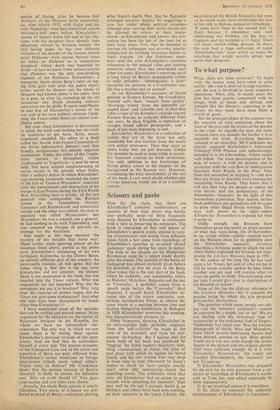To what purpose?
What, then, are these purposes? To begin with, the money must have come in quite useful : the USSR is short of foreign currency, and the KGB is involved in many expensive operations. Then, also, in recent years the KGB has been greatly concerned with its image, both at home and abroad, and eulogies like Mr Heren's—appearing in the Times, no less—must have done them a world of good.
But the principal object of the exercise was the creation of total confusion about the facts of the past and the events of the present in the USSR. As regards the past, the more versions there are around, the harder it is to establish the truth. Everything becomes reduced to an absurdity. Mr Crankshaw has already accepted Khrushchev's fabricated February 1939 Plenum and unhesitatingly included it in his Chronology. Others might well follow. The main preoccupation of the KGB, of course, is with the present, and in particular with the vast flow of underground literature from Russia to the West. They have not succeeded in stopping it—and now they are trying to discredit every manuscript emanating from Russia. They know that it will not take long for people to realise the true nature, and the authenticity, of the Khrushchev 'memoirs'. In the light of this horrendous experience, they reckon, neither book-publiShers nor periodicals will be eager to print other illegal Soviet writings. They may well prove to be right—unless Khrushchev Remembers is exposed for what it really is.
Oddly enough, the Russians have themselves given the world an exact account of what they were doing. On 29 November, in an article which—rightly—poured, scorn on the Western press for its gullibility over the Khrushchev 'memoirs', Izvestiya described a fictitious scene in Which the late Allen Dulles explained his forthula for com- posing the Litvinov Memoirs back in 1951: 'In the course of his long life he has said quite a lot. Ninety per cent of what we put in will be words actually spoken by him, while another one per cent will contain what we want the public to think. The remaining nine per cent I would give over to descriptions of the beauties of nature.'
None of this has the slightest relevance to the Litvinov Memoirs—but it contains the precise recipe' by which the KGB prepared Khrushchev Remembers.
The question which many people are ask- ing—are the 'memoirs' authentic?—cannot be answered by a simple 'yes' or 'no'. We are not dealing with the customary type of manuscript or the traditional kind of forgery. Technology has taken over. Was the famous photograph of Stalin, Mao and Malenkov, from which several intervening figures had been deleted, genuine or 'not. Most people would say it was not, even though the actual figures in the picture and the original picture itself were authentic enough. So it is with 'Khrushchev Remembers: the words are (mainly) Khrushchev's, the 'memoirs' are not. To sum up: 1) Khrushchev Remembers was prepared by the KGB for its own purposes from a sel- ection of recordings of Khrushchev's words, sold to Time Inc, and edited separately by both organisations;
2) As an historical source it is worthless; 3) Its claim to represent the authentic reminiscences of Khrushchev is fraudulent.










































 Previous page
Previous page